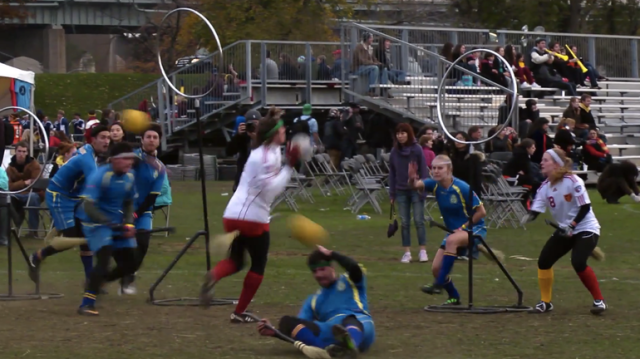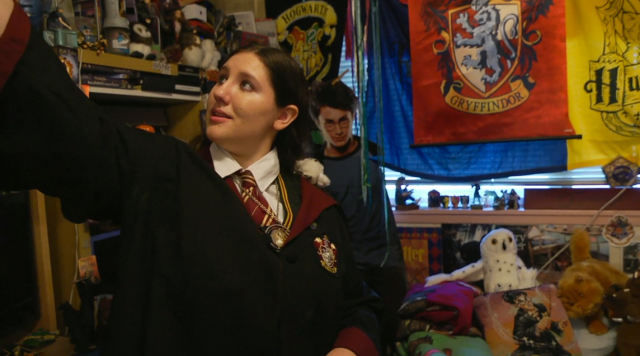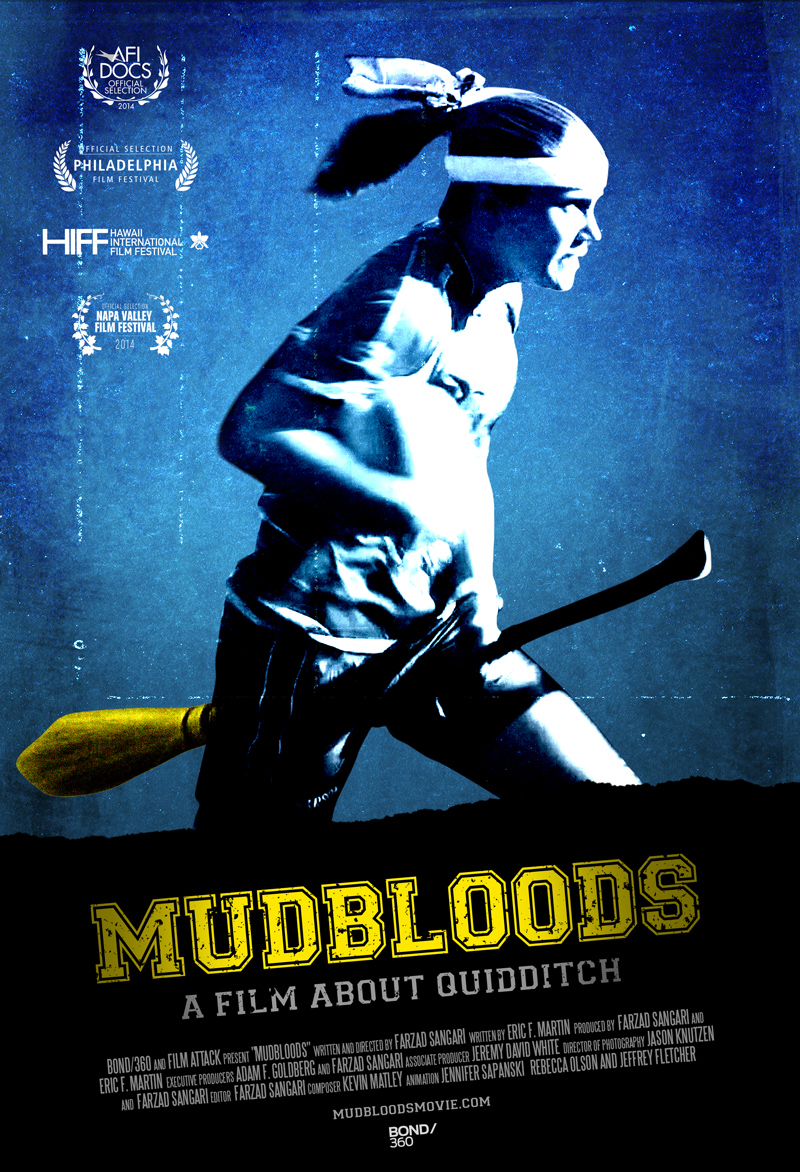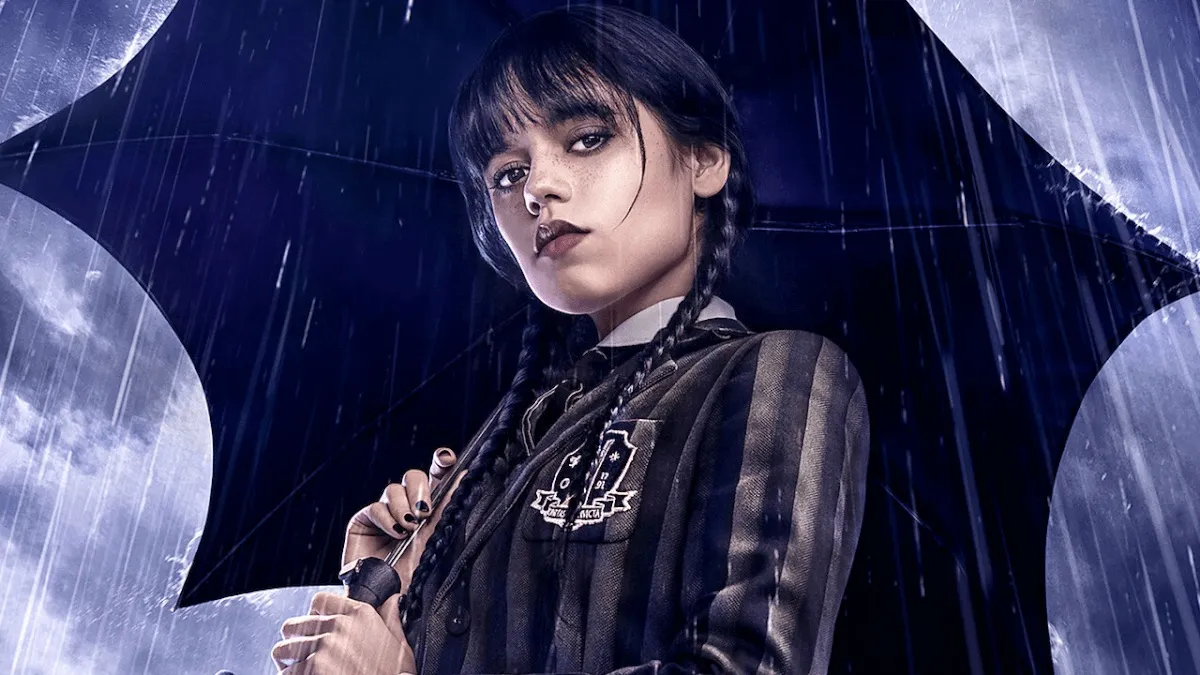If you haven’t heard of Mudbloods, don’t let the title fool you—it’s a surprisingly heartfelt and fascinating look into the world of collegiate-level Quidditch, which is a real sport that has nothing to do with magic. Our review of the documentary went up on Wednesday, but we also got the chance to speak with both the director Farzad Sangari and one of the former UCLA players, Ali Cottong, about the world they tried to capture together on film.
[Editor’s Note: both interviews were conducted at separate times, but we’ve combined them a bit to make for easier reading.]
The Mary Sue: From what I’ve read about you guys so far, you weren’t exactly an Harry Potter fan going in, Farzad. Can you talk about what it was that got you so interested in Quidditch to begin with?
Farzad Sangari: That’s true, I haven’t read the books. I literally was just walking by and I saw [the UCLA team], and I noticed was that at that moment it wasn’t just me watching them, it was a lot of people. Even though I had never seen Quidditch before, I immediately knew what it was. I think the series is such a prominent part of our culture and it sort of seeped into our culture in such a profound way that I immediately knew what it was. But initially it was just—the idea that you know, taking this thing that was sort of impossible and making it a reality. The first time that I saw it, I went home and googled it and saw what it was, and then I approached the team and Tom, who you saw in the movie. I was just sort of immediately drawn to him and the team, and I think that there’s a lot of interesting characters who make up not just the team but the larger Quidditch community, and so the more I kind of got to know them, that sort of took over beyond the novelty or the uniqueness of this thing that they were doing.
TMS: Ali, which side of the spectrum did you fall on when you first joined? Were you a fan at first or did you just think the sport looked cool?
Ali Cottong: Kind of both! I really loved the books as a kid and read all of them, a few of them multiple times, but I hadn’t read them in many years. When I started playing the sport I was in college. I saw them playing and thought, “That looks really cool!” and figured, why not give it a shot?
TMS: So I’ve got to ask as a follow-up, do you identify as a particular house?
Cottong: I guess I would hope to be in Gryffindor but I don’t know which one. Yeah, I guess I would hope to be chosen for Gryffindor.
TMS: What position did you usually play?
Cottong: Chaser. I played beater a few times, but definitely not tall enough or big enough or intimidating enough to be keeper. I thought chaser was the best for me.
TMS: Farzad, how did the team react when you first reached out? I imagine they get a lot of weird questions about Quidditch in general.
Sangari: I think this generation is very used to the kind of stuff like that. Like I said, the first time I saw them, and this happened all the time and you see it in the movie, there’s people filming them. When they play in a place that has a high foot traffic area, there’s always people filming them. I think now It’s died down a little bit because especially at UCLA they’ve established themselves a little bit, but I think they’re sort of used to it. I don’t think they were necessarily used to the documentary film [style], but I really spent a lot of time with them. I don’t think —especially Tom didn’t really realize the scope of what I was trying to do. But fortunately for me, they’re so—I think you have to be very open and invited if you are a Quidditch player because it’s such a new sport and there is sort of a stigma around it. They’re very proactive in educating people and bringing people in, and I think they’re used to that. But I also think going back to what I was saying earlier, I think this particular generation is very comfortable with being filmed and having questions asked about them. It doesn’t really bother them in the way that I think it would bother me for example.
TMS: What was it like being filmed?
Cottong: It wasn’t too bad. I mean you’re playing the sport so you’re not really thinking about “what do I look like?” You’re just more, “Okay I have to get the ball over there.” After a while you don’t even notice it, you know?
TMS: It seems like the documentary is very much your average sports narrative, with only the occasional reminder that it comes from a fantasy series. Was that intentional on your part, Farzad?
Sangari: To me it’s a sports doc. We have to set it up, unlike a documentary about basketball or football or something, we do have to spend a little bit of time explaining what it is and just untangling it from where it came from. That’s why it was important also to include not just the team but Alex’s storyline and also Katie’s storyline, for me, because—if you do a documentary about basketball, you don’t need to show that there’s a basketball organizing body or league. You don’t need to show that there’s football fans. But we had to do that a little bit. You know, it’s not the focus of the movie, but I think it’s important to give a little bit of context—not just where the sport came from but where it’s going. But yeah, to me it’s just a sports doc, and I think people who see it will experience it that way.
TMS: It’s surprisingly intense. I was really shocked by the level at which people are ramming into each other. What’s it like watching that from the sideline? ‘Cuz it doesn’t seem like they have a whole lot of protection. Did you get nervous watching?
Sangari: Not nervous. I mean, you try to stay objective as a filmmaker. It’s hard, because you develop these relationships with them. The harder thing was seeing them go through the ups and downs of winning and losing. You kind of get sucked into it that way, but you’re not watching it and thinking, “Oh man, this is intense.” I spent so much time with them that it just was intense. That’s just the way it is. Girls and guys are playing a physical co-ed sport and it just sort of becomes, “that’s what it is.” It’s like, you don’t really watch even something as violent as football and think, “Oh my god, someone’s going to get hurt!” Even though people get hurt all the time. You just sort of fall into the sports part of it, who’s going to win and who’s going to lose.
TMS: Ali, is the thought of getting body checked on a semi-regular something that a lot of players have to overcome? Is it something that was hard for you, or did you come in not minding so much?
Cottong: I played soccer as a kid, so I was pretty physical then. I would get carded sometimes for hip checking other girls and I wouldn’t even feel it. So I was kind of excited to come to a sport where I could tackle people and get to do that. [During] my first year of playing during practice I fractured one of my ribs, but I still came back after that.
TMS: Wow, that is incredible. How often would you guys get together to practice?
Cottong: If I remember, there were practices multiple times a week. I would go once, maybe twice. I think at a certain point it was three times a week.
TMS: So how often, then, would you guys compete with other teams? Was it more of a fun thing or did it get pretty serious?
Cottong: Yeah, it was more of a fun thing. There were some other teams in the area but a lot of them weren’t as competitive as we were. Then we would sometimes go to tournaments and those were more fun because we could play teams from other areas that we wouldn’t have access to otherwise.

(Screenshot via CNET)
TMS: Farzad, Did you ever try your hand at playing it yourself?
Sangari: For sure! That was one of the first things that I did with them. It was really helpful. It helped me see how athletic and hard it was. You’re running around with one arm and there’s three things happening at once—there’s the quaffle game, there’s the bludger game, and there’s the snitch that comes onto the field. It really helped me see how imaginative they were, making this thing a reality. Things are going by so fast and I just realized that playing the game helped me get a sense of—“Oh, I see why so many people are drawn to this thing.” It’s so unique, it’s very athletic, and it’s got this theatrical element that sort of subverts the whole idea of what a sport actually is. It’s like this uber-sport, in my mind.
TMS: Is the catching of the Snitch always as abrupt on the field as it seems in the documentary?
Sangari: Sometimes yes, sometimes no. There’s no planning it. That’s the thing with the snitch—that’s the thing about the game, there’s no clock, there’s no halves, there’s no stoppage of play, and the only way to win is to get the snitch. Sometimes the snitch takes —a game of Quidditch can take 15 minutes or it can take 45 minutes. It’s all dependent on that.
TMS: What’s the longest game you saw while you were filming?
Sangari: I heard—I didn’t film this, but I heard there was a game that went overnight. Like, they just got tired and they all slept on the field. This was very early on. I don’t know if that’s true, you’ll have to ask Tom or Alex about it, but I heard that in an early incarnation there was one [game] that took the whole day. I think that speaks to their sort of—”Okay, we’re just gonna stop now.” And then they did. The longest game that I saw was probably one of the scrimmages with UCLA or Occidental. Ones of those games took a very, very long time, because the snitch was riding a bike around the field and wouldn’t let them catch him. It’s hard enough to run one-armed with somebody, but if they’re on a bike they’re just going to taunt you.
TMS: Ali, how old were you during the events of movie? Did you have a couple years after that to watch as the sport kept growing?
Cottong: I joined my senior year of college, so I was 21. The World Cup was in the fall of 2011, so after I graduated, but I was still in the area and played with the team. After that I played with a community team called the Lost Boys, but I don’t think they exist anymore. I think they branched out into different teams.
TMS: I was about to ask—with a lot of college clubs it seems like people miss them after they graduate and then find adult versions of those clubs to be in. So you guys did that with Quidditch?
Cottong: Yeah, we took some graduates from other schools and people who’d just played with friends and we started with them. I went to the next World Cup with them and saw how it had grown so much. There were even more teams from more countries across the world.
TMS: Are you still involved now?
Cottong: No, not anymore. I’m super excited to go see the film this weekend and get to reconnect with some of my own teammates, but I don’t play anymore. I live in San Francisco and there’s a team down in Mountainview and I practices with a couple of times, but it’s a really long drive to do something once a weekend. Also I just didn’t want to get hurt—I have an adult job and need to be ready to go most days and didn’t want to be in a sport that was so potentially brutal.
TMS: Is this the first time you’re seeing the film? What are you hoping for when you go to see it?
Cottong: Yes! I’m so excited. I watched the trailer a couple months ago when it first came out and had forgotten about so many of the things that happened, so I started getting really emotional. I expect that in the film we’ll be watching the World Cup and basically reliving that whole experience again. Hopefully I won’t cry, but I might.
TMS: What’s the response been like so far?
Cottong: I’ve read some of the articles that different publications have written online and those are cool, seeing people see Quidditch how we see it. But I haven’t been following any of the fan response.
Sangari: We’ve only been out where people can get it since last month. As early as June we were starting to get into some festivals, like AFI doc, and right now we’re at Napa. But the film has only been available for people to see on iTunes and on our website since last month, and we recently just got added to Netflix which is a big coup for us. It’s been great. It’s hard to tell online what’s happening, I think the reaction to the film in general is either very positive or very negative. When I tell people I’m doing this movie, they either stare at me blankly or they’re really, really excited right away. It takes someone who’s willing to go on this ride and see this thing as this creative, imaginative endeavor. I think there’s more people like that, and because of that we’ve gotten a lot of good press and feedback.
TMS: Do you find that it’s mostly Harry Potter fans who seem into it, or is the sub-section of people who like the movie broader than that?
Sangari: I think it’s a lot broader than that. As you saw in the movie, a lot of Quidditch is attempting to separate themselves from that culture. As much as they draw on it, they’re also fighting for it to be this distinct autonomous thing. At the same time they’re courting that audience, they’re sort of looking for legitimacy as their own thing. And I think that leads to a variety of audiences. It’s not just people who have that HP background, although I think that’s a big part of it. I think it’s people who, like you said, are interested in sports and sports documentaries. But I think there’s just a general mainstream audience for the film because like I said earlier, there’s interesting characters and people who go on this journey. I think that’s also something that’s appealing to people.

Katie Aiani showing off her Potter collection.
TMS: How have people been reacting to the title specifically? In the books, that term has an… interesting background.
Sangari: It’s come up a few times. If you look up—there’s an op-ed I wrote about the title in the Daily Beast that lays it all out about why I picked the title. For me, it’s sort of the perfect thing to sum up this group of people. It risks being misunderstood taken at face value—if people think this is a Harry Potter movie, then that title’s not going to work because it is something that’s derogatory. But just like Quidditch itself, we’re not using it in that context. Quidditch is not trying to be an extension of the series, it’s looking to be its own thing. In the same way, I think we’re trying to take the term and make it a new term and appropriate it in the same way that I think they’re sort of appropriating something that is impossible and making it into something that adds value and meaning into their lives.
TMS: Ali, what would you say that you miss the most about Quidditch now that you’re not participating anymore?
Cottong: I really, really enjoy being a part of the community. It’s just such a great group of people. Everyone’s so open and accepting and super positive. I really do miss that part—and having a practice to go to and getting excited to go to the World Cup, just being really a part of that world.
TMS: Would you ever go back to the world cup as a spectator, Ali?
Cottong: Yeah, I think if it was easy to get to, in California, I would definitely go.
TMS: Farzad, Now that you’ve been a part of this world, would you ever want to go back. Have you kept up with the sport? Would you want to explore how it’s changed?
Sangari: I think we were very lucky to get in at a crucial time in the sport, at a point where it’s really starting to take off. It’s evolved a lot. I mean, it’s exponentially growing. I’ve been in touch with them, just because I’m in touch with all the people on the team and even certain organizers like Alex. I’m still close with a lot of players and people associated it. I think what’s interesting about this film is it sort of caught it at a time when its development was still in the works. Now I think the sport has evolved to a point where it IS more legitimate and accepted.
TMS: Would you want to read the books now? Or at this point do you not want another version of Quidditch in your head?
Sangari: That’s a good question! I don’t know, I haven’t thought about it. I do sort of catch the movies here and there, but I haven’t gotten into the books, no. I still haven’t. I’m sort of reading the Guillermo Del Toro Strain trilogy right now, actually. It’s pretty amazing.
TMS: Would you ever want to do a documentary about vampires?
Sangari: [laughs] I don’t know, I feel like… it’s been done a lot of different ways. There’s only one Quidditch doc, but there’s a lot of vampire stuff out there.
–
Mudbloods is available on Netflix Instant Watch, iTunes, and Amazon Video, but if you’d like to support the film by buying a digital download directly from them, you can use a $1 off coupon at the Mudbloods movie website by typing in the code MARYSUE.
Are you following The Mary Sue on Twitter, Facebook, Tumblr, Pinterest, & Google +?









Published: Nov 21, 2014 04:02 pm